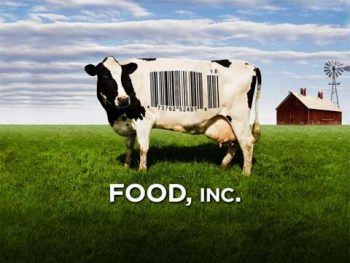 By Eisa Nefertari Ulen, published in The Defenders Online, August 5th, 2009
By Eisa Nefertari Ulen, published in The Defenders Online, August 5th, 2009
In the film, Food Inc., documentarian Robert Kenner captures the grotesque side of the food processing industry. Dark, dystopian images of food processing machines loom eerily as the camera pans to capture their frightening size. Animals, barely living, just dead, sliced, unrecognizable, pass by anonymous workers dressed in red-splattered white.
A woman coughs as she exits a chicken house, several dead, overweight birds in her hands, and explains why the food we eat never sees sunlight, never walks more than a step or two before falling over, their hormone-injected bodies dysfunctional and gross.
The woman is Carole Morison, a Perdue Farms grower who has become allergic to all antibiotics because of the high doses she is exposed to, handling birds who are doped up with the stuff. She’s fed up, she says, of living, like “a slave to the company, and she speaks for those even less powerful, those who catch truckloads of terrified birds in the darkest hours for the multinational corporations that feed us.
“Traditionally, it’s been African-American men,” doing some of the dirtiest work for the corporations that control what we eat, Morrison says. “Now we’re seeing more and more Latino catchers, undocumented workers, and, from their point of view, they don’t have any rights and they’re just not going to complain. You know, the company likes these types of workers.”
Morison, who lost her contract with Perdue when she refused to switch to the dark, tunnel-ventilated chicken houses the company requires as an “upgrade,” is like most growers in terms of her financial woes. According to Food, Inc., the typical grower with two chicken houses, even one who follows all the company mandates, has borrowed over $500,000 and earns about $18,000 a year. Yet even they make a better living working for the food industry than the anonymous women and men Morison talks about in the film, like the folk on whose behalf Eduardo Pena, a union organizer in Tar Heel, N.C., serves as an advocate.
Pena represents workers at Smithfield Hay Processing Plant, the largest slaughterhouse in the world. He says that the big food corporation “went through” poor folk, both white and black, in Tar Heel “rather quickly.” African Americans are now bused in from towns up to 100 miles from the slaughterhouse—towns like Bensfield, South Carolina and Clinton, North Carolina. And workers also come from as far away as Mexico.
Just as African Americans were recruited by northern industry during The Great Migration, workers are recruited from small towns in Mexico to labor in the slaughterhouses. Workers who have lived around the Smithfield Plant for 10 to 15 years are vulnerable to early morning immigration raids, though the company bosses are never fined for hiring them in the first place. In the film, Pena asks us all to think of the mostly black and brown folk who are, he says, “processing your bacon, your holiday ham.”
“They have the same mentality toward the workers,” Pena says, “as they do the hogs. You know, the hogs, they don’t really have to worry about their comfort because they’re temporary. They’re going to be killed.” Likewise, he continues, the multinational corporations don’t worry about “the longevity” of the worker. Covered with blood, feces, and urine from performing repetitious, mind-numbing tasks along the slaughterhouse assembly line, “basically you’re treated as a human machine.”
Meat packing has become one of the most dangerous jobs in America, and only the most dispossessed see what really happens when warehoused animals are killed, cut, and covered in plastic.
Most of us don’t think that what we put in our mouths has come out of a machine. Food Inc. destroys the mythological construct of bucolic farming life in this country. The film helps the viewer understand why junk and fast food products are cheaper than real food like carrots and broccoli. It also helps us understand why we often binge on corporate products like french fries and potato chips, and why these tastes are ubiquitous on dollar menus—and our plates.
Cheap, readily available, and dangerous, these products have contributed to a near epidemic of diseases like Type II diabetes in low-income communities. While 1 in 3 Americans born after 2000 will contract early onset diabetes, among people of color, the rate will be 1 in 2.
The industrial food system is killing us, and making us think we’re full and satisfied as we die. How many of us know which products contain genetically modified food or cloned meat? How many of us whose grandparents and parents graduated from land grant colleges know why there are virtually no more public seeds—that big companies have trademarked and now actually own the God-given source of life?
Food Inc. helps uncover why we don’t know anything about that which is most intimate—the food we put inside our bodies every day—and what we can do to make it better.
Start by going to see this important film. View the play dates. And get involved. Find ten simple things you can do to change our food system.